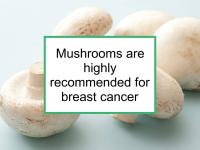Mushrooms have been shown to have anti-inflammatory, antiviral, cholesterol-reducing, and immune-enhancing properties, as well helping to reduce blood pressure and blood sugar levels. Various mushroom extracts have been reported to reduce proliferation and growth of a wide variety of human cancer cells.
Mushrooms contain numerous compounds with anti-cancer activities, including various β-glucans and lectins, butein, ganodermanontriol, grifolin, lentinan, marmorin, and nebrodeolysin. White button mushrooms are also a good source of conjugated linoleic acid (CLA). Portobello mushrooms that have been exposed to UV light are a good source of vitamin D. Generally speaking, mushrooms are a good source of dietary niacin (vitamin B3) and riboflavin (vitamin B2).
Breast cancer-related effects of eating mushrooms
Multiple population studies have reported links between frequent mushroom consumption and reduced breast cancer risk. A variety of mushroom types appear to have beneficial effects with respect to breast cancer prevention. Below we present breast cancer-related information concerning mushrooms commonly available in the U.S.
White button mushrooms
White button mushrooms (Agaricus bisporous), also known as button mushrooms, white mushrooms, or table mushrooms, are the most common mushrooms found in supermarkets. Portobello and crimini mushrooms are more mature forms of Agaricus bisporous — as they age, white button mushrooms first mature to become cremini mushrooms (which are brown) and subsequently into portobellos (also brown and much larger).
Diets high in such mushrooms may lower the risk of estrogen receptor positive (ER+) breast cancer, especially in postmenopausal women, by reducing aromatase activity, a process by which androgens are converted to estrogens in the body. White button mushrooms have also been shown to inhibit proliferation of ER+ breast cancer cells. However, they should be eaten cooked, not raw (see Additional comments below).
Maitake mushrooms
Maitake mushrooms (Grifola frondosa) are sold dried or fresh in some specialty markets and supermarkets. Maitake mushrooms have been shown to reduce growth, inhibit angiogenesis, and induce apoptosis of human breast cancer cells in the laboratory. For example, maitake extract has been shown to reduce triple negative (ER-/PR-/HER2-) breast cancer cell viability and reduced their metastatic potential. A 2024 study also reported that maitake mushroom extract enhanced the treatment effects of trastuzumab (Herceptin) in HER2+ breast cancer.
On the other hand, a human trial of maitake mushroom supplementation in postmenopausal breast cancer survivors found that, contrary to expectations, maitake extract had both immune enhancing and immune suppressant effects at various doses. Safe and effective dosages of supplemental maitake mushroom have not been established.
Shiitake mushrooms
Shiitake mushrooms (Lentinus edodes) are also available fresh or dried in grocery stores and specialty markets. Shiitake mushrooms have been found to inhibit increases in tumor volume of human breast cancer cells implanted in mice. Dried shiitake mushrooms are also a good source of dietary selenium, which is associated with reduced risk of breast cancer. On the other hand, these mushrooms incorporate moderately high levels of copper (approximately 0.25 mg per ounce), which has been shown to increase angiogenesis and metastasis of breast cancer, especially in women with aggressive disease such as inflammatory breast cancer (IBC), triple negative (ER-/PR-/HER2-) or HER2-positive (HER2+) breast cancer. While copper is a vital nutrient, women with breast cancer who are not anemic probably should not exceed the RDA (recommended daily allowance) of approximately 0.9 mg.
Reishi mushroom
Reishi mushroom (Ganoderma lucidum) usually is sold only in powder form (typically in capsules), as a liquid extract, or as a tea, since reishi mushrooms are too bitter and tough to be eaten as food. Reishi mushroom extracts have been shown to inhibit the proliferation, adhesion, angiogenesis, migration, and invasion of several types of breast cancer cells, including ER+/PR+ and triple negative cells.
The addition of green tea extract to reishi extract has been shown to have a synergistic effect in the inhibiting adhesion, migration and invasion of hormone receptor negative (ER-/PR-) breast cancer cells.
Studies concerning using reishi extract during chemotherapy have produced inconsistent results. One study reported that reishi extract reduced the cytotoxic effects of doxorubicin in ER+/PR+ breast cancer cells. The same study reported that reishi increased the effectiveness of tamoxifen. However, note that reishi extract has been shown to have estrogenic effects, significantly increasing uterine weight in young rats in one study and promoting ER+/PR+ cell proliferation in another.
Reishi extract has been shown to be effective in inhibiting inflammatory breast cancer (IBC) progression, one of the few foods to have demonstrated beneficial impact on this highly aggressive form of breast cancer. Even those with ER+ IBC might benefit from reishi. Therefore, on balance, reishi probably should be avoided by those with ER+ breast cancer apart from those with IBC.
Additional comments
White button and related mushrooms should be eaten cooked. Raw white button mushrooms have been shown to cause various cancers when consumed by mice, presumably due to their agaritine and related content. Agaritine, a type of mycotoxin, is neutralized by heat exposure.
In addition to neutralizing the relatively small fraction of carcinogens in raw white button and related mushrooms, cooking would serve to eradicate any pathogenic bacteria on their surface. It makes sense to thoroughly clean and cook any such mushrooms before consuming them.
The breast cancer risk for Latina mushroom agricultural workers in California has been reported to be sharply higher than the risk for any other type of agriculture worker, for reasons that are not clear. This high risk may have been the result of pesticide use in enclosed areas or contaminants in the compost in which such mushrooms typically are grown.
Sources of information provided in this webpage
The information above, which is updated continually as new research becomes available, has been developed based solely on the results of academic studies. Clicking on any of the underlined terms will take you to its tag or webpage, which contain more extensive information.
Below are links to 20 recent studies concerning mushrooms and their components. For a more complete list, including less recent studies, please click on mushrooms.
